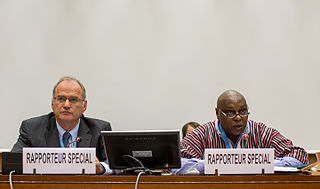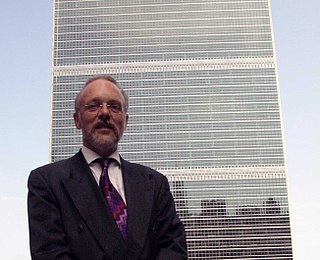The United Nations Commission on Human Rights (UNCHR) was a functional commission within the overall framework of the United Nations from 1946 until it was replaced by the United Nations Human Rights Council in 2006. It was a subsidiary body of the UN Economic and Social Council (ECOSOC), and was also assisted in its work by the Office of the United Nations High Commissioner for Human Rights (UNOHCHR). It was the UN's principal mechanism and international forum concerned with the promotion and protection of human rights.

The United Nations Human Rights Council (UNHRC) is a United Nations body whose mission is to promote and protect human rights around the world. The Council has 47 members elected for staggered three-year terms on a regional group basis. The headquarters of the Council are at the United Nations Office at Geneva in Switzerland.

Special rapporteur are titles given to independent human rights experts whose expertise is called upon by the United Nations to report or advise on human rights from a thematic or country-specific perspective. Depending on the specific mandate, there can also be working groups composed of an independent expert from each of the five UN regional groupings. Their work falls within the scope of "special procedure" mechanisms under the United Nations Human Rights Council, and their contributions can advance human rights through a variety of activities, including, but not limited to improving access to redress, policy reform, mainstreaming human rights, raising human rights awareness, and acting to prevent or cease rights violations.
Felix Ermacora was a leading human rights expert of Austria and a member of the Austrian People's Party.

Angela Kane is a German diplomat and was formerly the UN High Representative for Disarmament Affairs and Under-Secretary-General for Management in the United Nations.
Human rights in Estonia are acknowledgedas being generally respected by the government. Nevertheless, there are concerns in some areas, such as detention conditions, excessive police use of force, and child abuse. Estonia has been classified as a flawed democracy, with moderate privacy and human development in Europe. Individuals are guaranteed on paper the basic rights under the constitution, legislative acts, and treaties relating to human rights ratified by the Estonian government. Estonia was ranked 4th in the world by press freedoms.

Franz Baumann is a German former United Nations official who, until the end of 2015, served as Assistant Secretary-General and United Nations Special Adviser on Environment and Peace Operations at the United Nations Secretariat in New York. From 2017 to 2021, he was a visiting research professor at New York University.
Defamation of religion is an issue that was repeatedly addressed by some member states of the United Nations (UN) from 1999 until 2010. Several non-binding resolutions were voted on and accepted by the UN condemning "defamation of religion". The motions, sponsored on behalf of the Organization of the Islamic Conference (OIC), now known as the Organisation of Islamic Cooperation, sought to prohibit expression that would "fuel discrimination, extremism and misperception leading to polarization and fragmentation with dangerous unintended and unforeseen consequences". Religious groups, human rights activists, free-speech activists, and several countries in the West condemned the resolutions arguing they amounted to an international blasphemy law. Critics of the resolutions, including human rights groups, argued that they were used to politically strengthen domestic anti-blasphemy and religious defamation laws, which are used to imprison journalists, students and other peaceful political dissidents.
The Universal Periodic Review (UPR) is a mechanism of the United Nations (UN) Human Rights Council (HRC) that emerged from the 2005 UN reform process. Commonly referred to as the UPR, it was established by General Assembly resolution 60/251 of 3 April 2006, the UPR periodically examines the human rights performance of all 193 UN Member States. It is intended to complement, not duplicate, the work of other human rights mechanisms, including the UN human rights treaty bodies. This is the first international human rights mechanism to address all countries and all human rights. The Working Group on the UPR, which is composed of the HRC's 47 Member States and chaired by the HRC President, conducts country reviews.

The United Nations Special Rapporteur on the promotion of truth, justice, reparation and guarantees of non-recurrence works independently to inform and advise the United Nations Human Rights Council on the promotion of human rights-compliant approaches to transitional justice.
Human rights and climate change is a conceptual and legal framework under which international human rights and their relationship to global warming are studied, analyzed, and addressed. The framework has been employed by governments, United Nations organizations, intergovernmental and non-governmental organizations, human rights and environmental advocates, and academics to guide national and international policy on climate change under the United Nations Framework Convention on Climate Change (UNFCCC) and the core international human rights instruments. In 2022 Working Group II of the IPCC suggested that "climate justice comprises justice that links development and human rights to achieve a rights-based approach to addressing climate change".
The Special Rapporteur on the Right to Food is a Special Rapporteur who works for the United Nations and reports on the right to food. The mandate was established in 2000 by the former Commission on Human Rights which appointed the first Rapporteur, Dr. Jean Ziegler. In 2008 the second Rapporteur, Dr. Olivier De Schutter, was appointed by the United Nations Human Rights Council, the successor to the Commission. In 2014 the third Rapporteur, Hilal Elver was appointed. In 2020, the current Rapporteur, Michael Fakhri, was appointed.

The United Nations special rapporteur on the rights to freedom of peaceful assembly and of association works independently to inform and advise the United Nations Human Rights Council. The special rapporteur examines, monitors, advises and publicly reports on the rights to freedom of peaceful assembly and of association worldwide.

Agnès Callamard is a French human-rights activist who is the Secretary General of Amnesty International. She was previously the Special Rapporteur on extrajudicial, summary, or arbitrary executions appointed by the United Nations Human Rights Council, and the former Director of the Columbia University Global Freedom of Expression project.

The Report of the Commission of Inquiry on Human Rights in the Democratic People's Republic of Korea is the landmark document resulting from the investigations on human rights in North Korea commissioned by the United Nations Human Rights Council in 2013 and concluded in 2014.

The Committee Against Torture (CAT) is a treaty body of human rights experts that monitors implementation of the United Nations Convention against Torture by state parties. The committee is one of eight UN-linked human rights treaty bodies. All state parties are obliged under the convention to submit regular reports to the CAT on how rights are being implemented. Upon ratifying the convention, states must submit a report within one year, after which they are obliged to report every four years. The committee examines each report and addresses its concerns and recommendations to the state party in the form of "concluding observations." Under certain circumstances, the CAT may consider complaints or communications from individuals claiming that their rights under the convention have been violated.
The Working Group Against Enforced and Involuntary Disappearance has been set up to investigate cases in which persons are detained or killed by states in secret prisons and the corpses are disposed of so that nothing can be proven to them.
Stanley Michael Lynk is a Canadian legal academic. He is currently an associate professor at the University of Western Ontario and the Special Rapporteur on the situation of human rights in the Palestinian Territories occupied since 1967.
Mihir Kanade is an author and professor of international law, human rights and development at the University for Peace (UPEACE), an international treaty-based organization and institution of higher education established in pursuance of Resolution 35/55 adopted by the United Nations General Assembly in 1980. He holds the concurrent positions of the Academic Coordinator of UPEACE since 2016, the Head of its Department of International Law since 2014, and the Director of the UPEACE Human Rights Centre since 2009. Kanade is best known for his contribution to the promotion of the human right to development. He chairs the drafting group appointed by the Office of the United Nations High Commissioner for Human Rights and the Chair-Rapporteur of the Intergovernmental Working Group on the Right to Development, for preparing the “zero draft” of a legally binding instrument on the right to development. On 13 March 2020, Kanade was elected by the United Nations Human Rights Council as a member of the Expert Mechanism on the Right to Development in representation of the Asia-Pacific region. The Human Rights Council renewed his mandate for another three years on 4 April 2023.
Wolfgang Benedek is an Austrian jurist and author.










